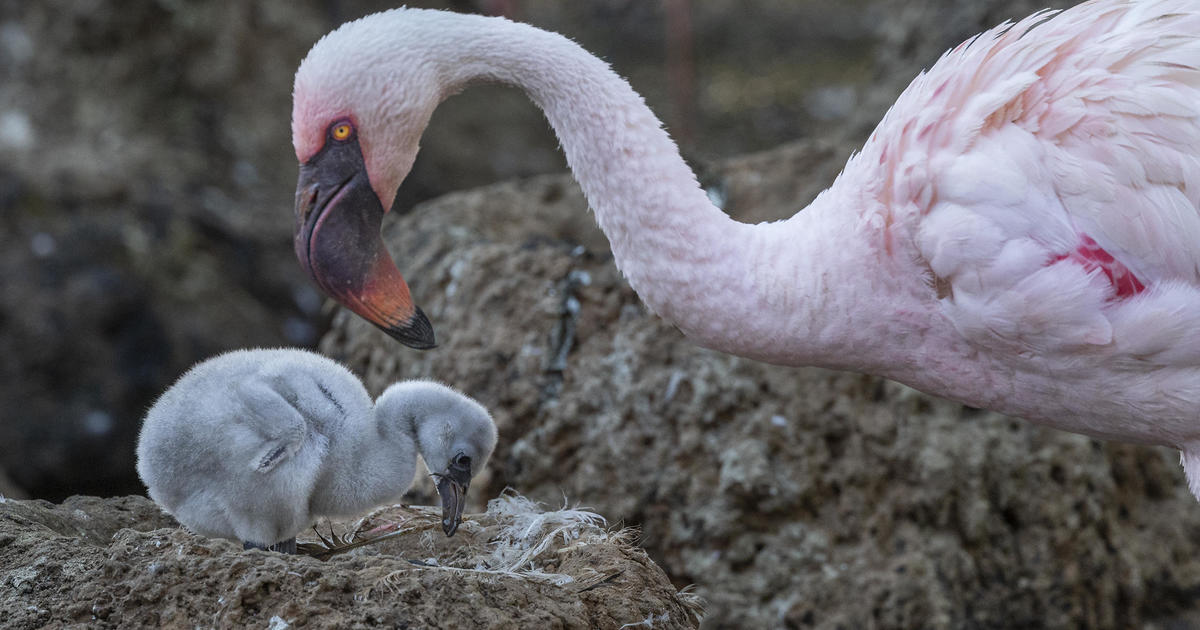The San Diego Zoo Safari Park has announced a heartwarming success story: two male lesser flamingos have successfully hatched and are now caring for a chick. This remarkable event highlights the versatility and adaptability of animal parenting behaviors, challenging traditional notions of family structures. The two male flamingos, both in their 40s, had initially been given a fake egg to keep them occupied and prevent interference with other nests. Their exceptional care of the fake egg led zoo specialists to entrust them with a real, fertile egg, leading to the birth of a thriving chick late last month. This accomplishment isn’t unique to this pair; same-sex parenting has been observed in various bird species, underscoring the complexity and diversity of avian family dynamics. This case, however, provides valuable insight into the care and nurturing these magnificent birds provide their young.
Same-Sex Flamingo Parenting: A Natural Phenomenon
The San Diego Success Story
The San Diego Zoo Safari Park’s pair of male lesser flamingos successfully hatched and are now nurturing a chick. Their dedication to their parental responsibilities involves alternating brooding duties, ensuring the chick receives consistent warmth and care. The flamingos’ adeptness in caring for their offspring is a testament to their innate parenting instincts, showcasing that successful parenting is not limited by gender. The care specialists at the zoo were initially hesitant, yet the flamingos exhibited exceptional skills with a surrogate egg, ultimately persuading the zoo staff to place a real egg under their care. The zoo’s public announcement has captured significant public attention and serves as a potent symbol of acceptance and natural diversity.
Same-Sex Parenting in the Animal Kingdom
This instance is not an isolated occurrence. Same-sex parenting has been observed across various animal species, including other flamingo species, eagles, penguins, and vultures. While the exact mechanisms leading to same-sex pairs raising offspring differ across cases, possibilities often include the adoption of abandoned eggs or the cooperative behavior driven by strong pair bonding within the species’ social structure. These instances showcase that the drive to nurture and raise young is not exclusive to traditional pairings, demonstrating the flexible and diverse ways animals adapt to their environment and form family units. Further research may be needed to gain further insight into the driving biological, social and behavioral patterns that lead to successful same sex parental care.
Lesser Flamingo Chick Development and Parental Care
The Chick’s Development
The newly hatched chick, approximately the size of a tennis ball, possesses gray down feathers which gradually transform into the species’ distinctive pink plumage. The parents feed the chick crop milk, a nutritious substance produced in their upper digestive tract, a common behavior among flamingos, not solely restricted to the parent pair. Interestingly, this feeding process can temporarily lighten the parents’ pink feathers, which eventually return to their natural vibrant hue. The process of the chick’s development will be of great interest to ornithologists and other animal welfare scientists. The vibrant colors on flamingos are primarily developed in their diet, consisting of pigments of crustaceans that contribute to their unique plumage.
The Parental Roles
The male pair are diligently fulfilling their parental roles, demonstrating a remarkable level of care and coordination. This successful parental endeavor refutes misconceptions about gender limitations in parental care, highlighting the instinctual drive for nurturing among these magnificent birds. The parents feed, protect, and provide warmth for their offspring, reinforcing the fact that parental competence is not linked to sex but stems from cooperative behavior and nurturing instincts. The alternating brooding method adopted by the parents highlights not just successful parental care, but exceptional coordination as a couple, further pushing the bounds of previous beliefs surrounding avian mating habits and family units.
The Significance of this Discovery
Challenging Traditional Notions
The successful hatching and rearing of a chick by a same-sex pair of lesser flamingos challenges traditional views on animal family structures. The narrative often assumes strict gender roles in animal reproduction and parental care. The instance powerfully dispels this narrow perspective. The event effectively showcases nature’s remarkable adaptability and resilience. Scientific research now increasingly recognizes that the animal kingdom showcases vastly more biodiversity in mating patterns and family formations, and zoological findings frequently highlight similar stories in avian behavior.
Expanding Our Understanding of Animal Behavior
The occurrence is important scientifically and provides insight into the social structures, mating behavior and adaptations within the lesser flamingo species and potentially expands our understanding of animal behavior in general. Studying these same-sex parenting strategies will further understanding of complex social and breeding patterns and behavioral flexibility within various animal communities and across numerous species. This research could illuminate adaptive behaviors, genetic influences and the social and biological contexts surrounding unusual reproductive dynamics in a wider zoological perspective.
Conservation Implications
The success story not only breaks down gender barriers and expands our knowledge on animal behavior but holds importance from a conservation perspective. The zoo’s dedication to animal welfare and propagation efforts allows for these successful narratives, showcasing how focused conservation initiatives can benefit even unusual avian familial structures. Through successful same-sex pairing and chick raising, conservation can showcase more realistic views and broaden approaches in future animal care and breeding programs.
Take Away Points:
- Same-sex parenting is a natural phenomenon observed in various animal species, including lesser flamingos.
- The San Diego Zoo Safari Park’s successful case showcases the remarkable parental skills of male lesser flamingos.
- This event challenges traditional notions of animal family structures and expands our understanding of animal behavior.
- The findings highlight the importance of continued research and conservation efforts to support diverse animal family units.




